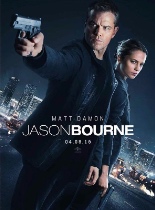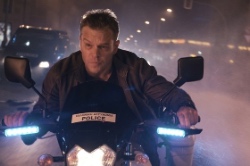
 Apparently having run out of intimidating-sounding words for the blank previously filled by “identity,” “supremacy,” “ultimatum” and “legacy,” the Bourne franchise goes for reunion-nametag basics with just Jason Bourne — nothing less and certainly nothing more. The moniker is fitting, because it’s as dull and unexciting as the film itself.
Apparently having run out of intimidating-sounding words for the blank previously filled by “identity,” “supremacy,” “ultimatum” and “legacy,” the Bourne franchise goes for reunion-nametag basics with just Jason Bourne — nothing less and certainly nothing more. The moniker is fitting, because it’s as dull and unexciting as the film itself.
When we last left Jason Bourne (Matt Damon, The Martian) in 2007’s The Bourne Ultimatum, he was … well, hell, I don’t recall, and given the amnesiac theme that kicked off the series, perhaps he doesn’t, either. But here, he’s boxing in bare-knuckle brawls that bring down Serbs in a single punch. Although these bouts are in Greece, the retired assassin’s participation seems rather out-and-about for someone so desperately wishing to stay off CIA radar. He is drawn back into his old employer’s shady world when former co-worker Nicky Parsons (Julia Stiles, 2006’s The Omen) uncovers some intel about Bourne’s past — namely, his father (Gregg Henry, Body Double).
 She snagged it as part of the complete information on CIA’s black operations by hacking into its mainframe; the agency even made it easy for her by dumping all the documents into one folder, handily labeled “Black Operations.” Nicky downloads it all to an encrypted USB drive, marked “ENCRYPTED” in block letters so as not to call attention to itself. And yet it does, so the jowly CIA director (Tommy Lee Jones, Mechanic: Resurrection) allows his expert on all things cyber (Alicia Vikander, Ex Machina) to bring Bourne in, while also secretly authorizing his elimination via a professional plugger (Vincent Cassel, Child 44).
She snagged it as part of the complete information on CIA’s black operations by hacking into its mainframe; the agency even made it easy for her by dumping all the documents into one folder, handily labeled “Black Operations.” Nicky downloads it all to an encrypted USB drive, marked “ENCRYPTED” in block letters so as not to call attention to itself. And yet it does, so the jowly CIA director (Tommy Lee Jones, Mechanic: Resurrection) allows his expert on all things cyber (Alicia Vikander, Ex Machina) to bring Bourne in, while also secretly authorizing his elimination via a professional plugger (Vincent Cassel, Child 44).
By all accounts (being the previous four adventures — five, if you count the Richard Chamberlain one, which I’m not), this setup should place the film in forward drive. But it doesn’t, and no amount of director Paul Greengrass’ usual shaky-cam shenanigans can distract from the fact that some ingredient crucial to the tried-and-true formula is off, if not missing altogether. Part of it is Damon himself; speaking only 45 lines of dialogue, most of them spartan, he cruises through this one as if he were a robot. With the hero being a man of very few words (288, to be exact), it seems as if he’s tired of the material, and his lack of investment is infectious. Since his character’s arc already was granted definitive closure at the conclusion of Ultimatum (hence, the title), the web of plots and subplots feel as predictable as whether the end credits will roll to the groove of Moby’s “Extreme Ways.” (And to dispel any shred of doubt, yes, of course they do.)
By the time the story has loop-de-looped itself around to the Las Vegas Strip for the much-hyped car chase — well, technically, Cassel’s in a tank — the element on which Jason Bourne has double-downed is revealed to be excess. Perhaps Damon shouldn’t have been so quick to bad-mouth The Bourne Legacy, the 2012 franchise spin-off that fronted Jeremy Renner (Avengers: Age of Ultron) and Tony Gilroy (Michael Clayton) in the respective absences of Damon and Greengrass. Unfairly dismissed by audiences because it wasn’t a fourth go-round for Damon, Legacy concludes with a motorcycle chase that is far more gripping than the rather lax sequence here, not to mention being the superior effort. Humdrum Ludlum at best, Jason is so lifeless, it’s stillborn, as opposed to “still Bourne.” —Rod Lott

Ooch. So, not good, huh? Too bad.